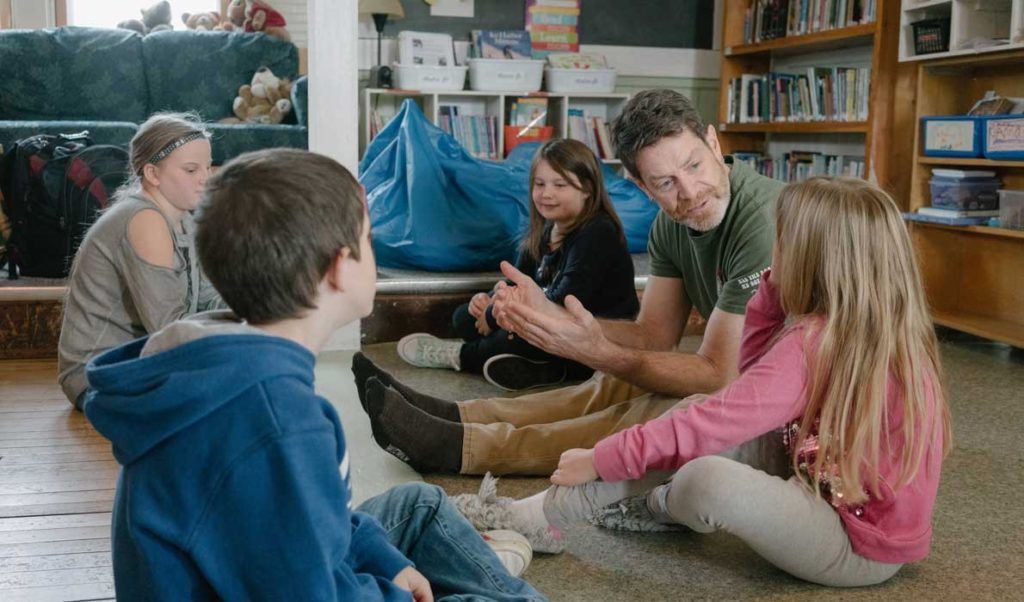Built in 1995 and operated now by the Bar Harbor-based Maine Seacoast Mission, the 75-foot long, steel-hulled Sunbeam V clears harbors of ice in the winter months, and in all seasons serves as a place of fellowship and communion for those unbridged islands of Maine that support year-round populations.
Douglas Cornman, director of island outreach, whose work ranges from leading worship services to arranging an anthology of creative works from the islands, notes that “the boat’s never locked, the coffee is always hot. Folks are welcome on board, and we’ll just sit and chat.”
While the rest of the world struggles to fall into the rhythms of Zoom meetings and a life wrenched online, this sort of digital connection is nothing new for the Sunbeam. In addition to serving as a space for community, telemedicine equipment aboard the ship ensures that islanders have access to quality, reliable healthcare.
Director of Island Health Services Sharon Daley travels to the islands and performs routine checkups herself, but islanders are also put in touch via video call with physicians and mental healthcare providers on the mainland. On-island services are varied and robust, from an eldercare program organized by Daley to Cornman’s work facilitating the transition of teenagers moving off their home island for high school on the mainland.
Still, Daley notes that most of the Sunbeam’s work is flexible and guided by immediate, voiced need.
“When we’re on the islands, Douglas and I walk around, and I make house calls. Or if I’m walking down the road, somebody goes by in a truck and they stop to talk to me. I do a lot of check-in like that.”
So, with the Sunbeam pulled from the water last June for a routine refit, Daley and Cornman continued to get to Maine’s unbridged islands by any means possible: ferries, mail boats, lobster boats. Their work chugged on. But temporarily moving the Sunbeam out of operation wasn’t the only challenge the Seacoast Mission would face in the year to come: the onset of COVID-19 ultimately cut off their island visitations altogether.
The Sunbeam now holds weekly “coffee chats” online, and Daley still urges islanders to contact her with any health concerns, emphasizing that “this is not the time to put off your healthcare needs.”
The relative isolation of the islands has not shielded them from ramifications of the coronavirus. Struggling before the pandemic, Maine’s lobster industry, intractable from the economic life of many of these communities, is taking an additional hit as tourism across the state dwindles and drives market prices down.
Cornman hears “reserve and caution in people’s voices, waiting to see how this all plays out.” He also laments the fact that the Seacoast Mission can no longer meet with the islanders on their home turf. Communication in person allows Daley and Cornman to understand how they can do their best work. “It’s often through chatting with someone on the boat that Sharon and I will hear one of the islanders talk about something we can help them with,” he said. “The goal wasn’t to intentionally find that out, but we found that out because we were there.”
Daley describes her work similarly: “It’s a lot of listening.” She notes that some islanders have even said to her, “I might not even come down to the boat, but I feel better when I just see it in the harbor.”
The Seacoast Mission has traveled to Maine’s unbridged islands since 1905 to deliver the same care and support that Daley and Cornman provide now. Daley feels like her work relies upon that longstanding reputation of the organization.
“When I first started this job, I had a lot of trust from the communities just because I work for the Maine Seacoast Mission.” Despite technological advancements, a massive renovation, and a myriad of changing circumstances, the efforts of the Sunbeam still move forward.
Daley says people have asked her why she continues to support communities of such small numbers. “I just don’t know what to say besides ‘Why wouldn’t you?’”
Captain’s log
The Sunbeam has been in dry dock since May of 2019, with the primary goal addressing interior hull rust, reports Capt. Mike Johnson.
“Steel boats rust from the inside out, given that access for routine maintenance is impossible. After 25 years, rust was beginning to take hold and we needed to address it before it became a structural issue,” he reported.
Since she was out of the water, the Seacoast Mission chose to update almost all of the interior, including bridge electronics.
COVID 19 along with rust being being more pervasive than expected has slowed progress of the work.
The initial estimate of cost was $1.2 million, but the additional rust damage has pushed up the cost, he said.
The good news, Johnson says, is that “We will be launching a ‘good as new’ boat in mid-August for less than half of new construction.”





